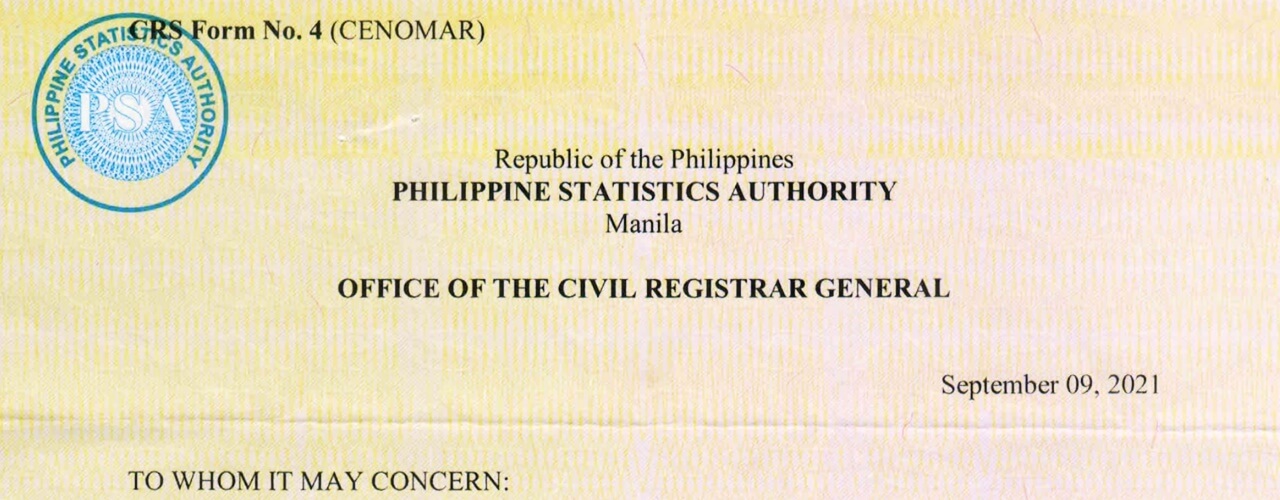
Annulment Philippines is a court case that ends a marriage between 2 Filipinos and is composed of a trial with testimony (which may be done over Videocon, depending on the judge).
This commonsense primer helps people who do not know much about Annulment by explaining:
- What Annulment in the Philippines is?
- What the Grounds for Annulment in the Philippines are, including answering common questions about Bigamy, length of separation and Psychological Incapacity Annulment
- Divorce vs Annulment or Legal Separation vs Annulment
Table of Contents
What is Annulment Philippines style?
Annulment Philippines style is a layman’s term for court cases that end a marriage based on grounds such as Psychological Incapacity, Bigamy, Incest, lack of consent of guardian/parent, lack of formal requisites of marriage among several other grounds.
Annulment in the Philippines can be either of 2 cases:
- Nullity of Marriage which includes Psychological Incapacity
- Annulment itself

Nullity of Marriage or Annulment both end Philippine Marriages but have different grounds and have different effects, so it’s important for you to know which type of case you fall under.
In terms of the court process, both are full-blown court cases with Witness Testimonies, Psychological evaluations, and trials.

It is because of the trial requirements that the case takes time and requires a lot of work on an Annulment Lawyer’s side.
(A lot of foreigners are not aware of the differences of Divorce vs Annulment. In fact, Annulment is very different and one of the major differences is the trial requirement which makes it more expensive and more time-consuming than they expect.)
What is the difference between Divorce vs Annulment?
The difference between Divorce vs Annulment is that Annulment has different grounds and requires a full-blown court trial which is why Annulment in the Philippines is more expensive and takes longer.

Let’s list the differences between Divorce vs Annulment:
- Annulment Philippines style requires a trial with witnesses and several court hearings. Divorce may not need a trial.
- Annulment grounds in the Philippines must be proven so there is a lot of lawyer time devoted to doing it well. This is why it is expensive. Divorce can often only use “irreconcilable differences” which may not even need to be proved.
- Divorce may not need a trial or proof of evidence so it is so much cheaper and faster than Annulment.
- Annulment has a lot of legal details that a good Annulment lawyer will attend to, so get the best Annulment lawyer you can. A lot will depend on him as well as you.

As you can see, Divorce vs Annulment is very different.
That’s why the Annulment Philippines style is really not the same as divorce.
Your expectations should be different as well.
Annulment is your only option if you live in the Philippines.
Annulment is also your only option if you are both Filipinos even if one of you lives abroad.

(A foreign divorce will not be recognized in the Philippines if you are both Filipinos as the time of the divorce. So, a Filipino divorcing a Filipino abroad is not an option.)
Bottomline: Annulment is the cheapest, easiest way to end a marriage between 2 Filipinos and also end their Conjugal Property Regime.
Legal Separation vs Annulment vs Divorce: What is the difference?
First, I’ll explain what the Annulment Philippines style is. Then, I’ll tackle the difference between Legal Separation vs Annulment vs Divorce.
This Chapter has the following sections:
- What is Annulment Philippines?
- Divorce vs Annulment
- Legal Separation vs Annulment
- Legal Separation vs Annulment vs Divorce: which case should I file?

Each section helps in explaining what each case is, and how the cases differ in grounds and proceedings.
Knowing how the cases work will also help you set expectations on costs and timelines.
What is the difference between Legal Separation vs Annulment?
The difference between Legal Separation vs Annulment is that Annulment ends a marriage and Conjugal Property while Legal Separation does not.
Legal Separation vs Annulment is also far more expensive and much harder to do.
I’ll explain.
Legal Separation awards the Conjugal Property to an Innocent Spouse.

Because Conjugal Property is on the line, the case pits the spouses against each other.
There are lots of documents prepared and lots of hearings.
There is a lot of work on a lawyer’s side.
This means than Legal Separation is far more expensive and time-consuming than Annulment.
Additionally, Legal Separation only deals with Conjugal Property and doesn’t end the marriage. You remain married to each other and the other spouse inherits after your death.

On the other hand, the Annulment Philippines style ends the marriage and the shared property regime.
It is not automatically combative.
Annulment Court Proceedings require less hearings and less legal drafting.
Because of this, Annulment vs Legal Separation is faster, cheaper and much easier to do.
Bottomline: Annulment is the fastest and cheapest way to end a Philippine marriage and divide Conjugal Property.
Legal Separation vs Annulment vs Divorce: What case should I file?
As you can see in the above comparisons of Legal Separation vs Annulment vs Divorce, most Filipinos will likely choose Annulment as it is the cheapest, fastest way to end a marriage between 2 Filipinos.
If you live in the Philippines, it is the only option available to end a marriage. If you are both Filipinos, it is the only option that the Philippines recognizes to end your marriage since a foreign divorce will not be accepted.

And Legal Separation vs Annulment doesn’t end the marriage and is more expensive, more difficult and more time-consuming to boot!
Bottomline: An Annulment is the fastest cheapest way to end a marriage and conjugal property regime between 2 Filipinos.
Grounds for Annulment in the Philippines

This Chapter discusses the grounds for Annulment in the Philippines in 4 sections.
I’ll discuss:
- All the grounds for Annulment in the Philippines
- Is Bigamy a Ground for Annulment in the Philippines?
- Is a 5-year Separation one of the Grounds for Annulment in the Philippines? (Or a 10- or 7-year separation)
- I’ll also discuss Psychological Incapacity Annulment and what you need to prove it. It is one of the most common grounds for Annulment in the Philippines so read this part in depth.
I’ve gone through each of these in depth below.
What are the Grounds for Annulment in the Philippines?
The grounds for Annulment in the Philippines can be Psychological Incapacity, Bigamy, lack of consent of Parent/Guardian if underage and lack of Formal Requisites of Marriage among many other grounds.
Annulment is a layman’s term for 2 types of court cases that end a marriage between 2 Filipinos: Nullity of Marriage and Annulment.
Nullity of Marriage and Annulment has the same effect of ending a marriage but they have different grounds.

Let’s go through the grounds below.
Grounds for Nullity of Marriage in the Philippines (Art 35 to 38 and 53 of the Family Code):
- Either party is below 18
- Unauthorized solemnizing officer like a priest unless both parties believed in good faith that there was a solemnizing officer
- No marriage license except under Article 27 to 24 of the Family Code.
- Bigamy is a ground for Annulment
- Mistaken identity
- Psychological Incapacity
- Incestuous marriages

Grounds for Annulment in the Philippines (Art 45 of the Family Code)
- Parties were from 18 to 21 and married without consent unless they lived together as man and wife after they reached the 21
- Either party was of unsound mind
- Consent was obtained by fraud or force
- Where either party could not physically consummate the marriage.
- Where either party had an incurable sexually transmitted disease

So, both Nullity of Marriage and Annulment end a marriage in the Philippines.
The big differences are the grounds and the fact that Children become illegitimate in Nullity of Marriage unless the ground used is Psychological Incapacity.
Some people thus need to use Psychological Incapacity since it keeps the children’s status Legitimate.
A child’s status may affect his/her inheritance rights.
Annulment Philippines: Is Bigamy a Ground for Annulment?
Yes, Bigamy is a ground for Annulment in the Philippines.
I get asked this question a lot.
I’ll deal with it specifically here.
A second marriage when the first marriage was not legally ended means that the second marriage was void from the beginning.
However, a case would still have to be filed for Annulment for this second marriage to be legally ended.

You will need proof of the Bigamy in the Philippines.
To declare that Bigamy is a ground for your Annulment, you would need to present several documents.
One of the documents is your spouse’s CENOMAR.
Your spouse’s CENOMAR should show 2 marriages and there should be no note that there was an annulment on the CENOMAR.

This can be presented as proof of Bigamy.
This is a key document for when you say to the court that bigamy is a ground for your Annulment case.
If you have this document, it is time to consider getting in touch with an Annulment Lawyer Philippines to assess and begin your case.
Please note that Annulment Court proceedings will still require a trial.
There is no such thing as an “automatic” legal end to the marriage.
You would still have to go to court and show proof of the bigamy to end your marriage.
Annulment Philippines: Is a 5-year separation Ground for Annulment?

No, a 5-year separation is NOT one of the grounds for Annulment in the Philippines.
(Or a 7-year separation or a 10-year separation)
It’s a frequent misconception which has no basis in the law.
Annulment grounds do not include the length of time you are apart.
However –
Although it is not a ground itself, it can be presented as supporting evidence of Psychological Incapacity Annulment.
What is Psychological Incapacity Annulment
Psychological Incapacity Annulment is when is when one spouse is psychologically incapacitated to comply with his obligations as a spouse. It essentially means one cannot act as a spouse to her/her partner.

To prove Psychological Incapacity Annulment, you can present evidence to prove the following:
- Drug, Alcohol or other substance abuse
- Gambling addictions
- Infidelity
- Verbal, Sexual or Physical abuse
- Other problems such as financial inability, immaturity, friction with in-laws or such

Please note that Psychological Incapacity Annulment must be proven.
That means there are going to be Witnesses testifying in court.
That also means an Annulment Lawyer in the Philippines will have to analyze all the facts from you and your Witnesses.
Then, your Annulment Lawyer will have to present all of this in court.
This trial portion and assessment of the facts means that there is a lot of work to be done and is a major reason why Annulment costs so much more. (And takes so much longer.)

Do not save on an Annulment lawyer.
A good Annulment Lawyer Philippines is detailed and will confirm residency and check your facts. This all takes time and effort.
Find the best and most trustworthy (not the cheapest!) Annulment lawyer you can – remember that 6% of Annulments are denied.
A good Annulment lawyer will reduce this risk.
Chapter 3: Annulment Process Philippines

In this Chapter, I’ll explain the Annulment Process and address common questions on the process, length, no appearance and cost.
There are 4 sections
- How do the Annulment Process Philippines work?
- How long Annulment in the Philippines takes?
- No Appearance Annulment and the risks you run.
- How much does Annulment Philippines cost?
I’ll also explain why Annulments Philippines take so long and why it costs what it does.
Annulment Process Philippines
The Annulment Process in the Philippines is composed of the following:
- Coordination with your lawyer
- Pre-trial where you identify the issues for resolution, the witnesses and evidence, and make stipulations on the facts within the scope allowed by the Rules.
- The trial is the presentation of evidence
- Decision
- Registration of Decision

As you can see, there are a lot of steps in the Annulment Process.
As a client, you will be asked to gather the information, identify the witnesses, get some documents and show up at court.
That’s it.
Your Annulment Lawyer Philippines on the other hand will be dealing with service or publication as the case may be, analyzing the evidence, interviewing witnesses and coordinating with the court.
This is NOT an easy job.
There is a lot of work in Annulment to do it well and to make the case the strongest it can be.
So get a good detailed Annulment Lawyer who will put in the work and also realize – the amount you pay is also linked to how much time he puts in and how much time you don’t have to put in.
And note that Annulment Philippines style does take a few years due to the number of steps in the process and the sheer amount of work – I know, since I’ve been a senior paralegal for several years.
How long does Annulment take in the Philippines?

Annulment proceedings can take 3 or so years from filing to Decision. The factors that influence a case are how quickly the evidence can be gathered, how overloaded a Court’s calendar may be to how efficient the Court’s staff is.
Why does Annulment take so long?
Well –
Philippine Courts are very overloaded and handle several times their workload.
This is why Annulment proceedings can take time.
Courts are so overworked that hearings are months apart. Court orders will also take time.
Additionally, court staff may be so overworked or not have a good process in place so coordinating with them and being able to get information is difficult.
It also may take some time for you to tell your story.
You will have to write down why your marriage ended to help prove the Annulment and identify Witnesses who support it. You will have to be detailed to build a strong case that is not denied.

Remember that the Annulment Philippines style requires proof.
You will need to provide that proof through screenshots, emails, text messages.
You will need to be clear as otherwise your Annulment lawyer may misunderstand.
Put in a lot of effort into organizing your evidence or explaining why Psychological Incapacity Philippines is the correct ground (if that is the Annulment Ground applicable to you.)
Can I have a No Appearance Annulment?

No, you cannot have a No Appearance Annulment (but some judges will allow you to do a Videocon testimony)
You must appear in court, one way or another.
Court requires that you testify as to the facts of the marriage and why it failed. This is part of how the Annulment Process in the Philippines works.
A No Appearance Annulment may be dismissed.
And if an Annulment Philippines is denied on its grounds, you cannot file an Annulment on those grounds again.
How much does Annulment cost in the Philippines?

An Annulment in the Philippines can cost anywhere from Php 350,000 and up, depending on the Annulment lawyer Philippines that you get and on where the court is located. Why does Annulment cost so much? I’ve you’ve read this section and this section you’ll realize that Annulment requires a full-blown trial and requires that the ground for Annulment be proved.
This means:
- Several Court Hearings
- Several legal pleadings
- So much more Coordination on the Annulment lawyer’s side.

There is a lot of work for Annulment Philippines style – I’d estimate several hundred hours of legal and paralegal time.
And this naturally affects the price.
Still, it’s best if you hire the best Annulment Lawyer Philippines that you can afford.
The price you pay dictates how much time your lawyer will spend on it, and usually also indicates how much experience he has.
It’s best to spend on your lawyer because it will minimize the case being dismissed.

Remember –
6% of Annulment Philippines are denied.
That’s about 1 in 20 cases.
Note – You cannot file an Annulment again if your Annulment in the Philippines is denied on it grounds.
You can file an Annulment again if it was denied without prejudice, but by then you will have spent more in both time and money then you budgeted.
So, spend on your Annulment Lawyer.
It’s the best way to make sure that your Annulment Philippine succeeds.

